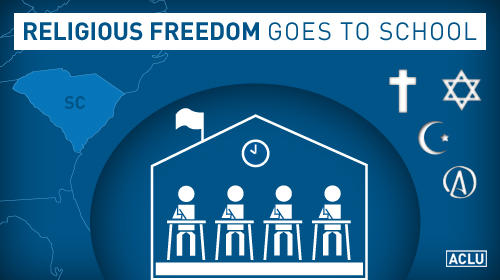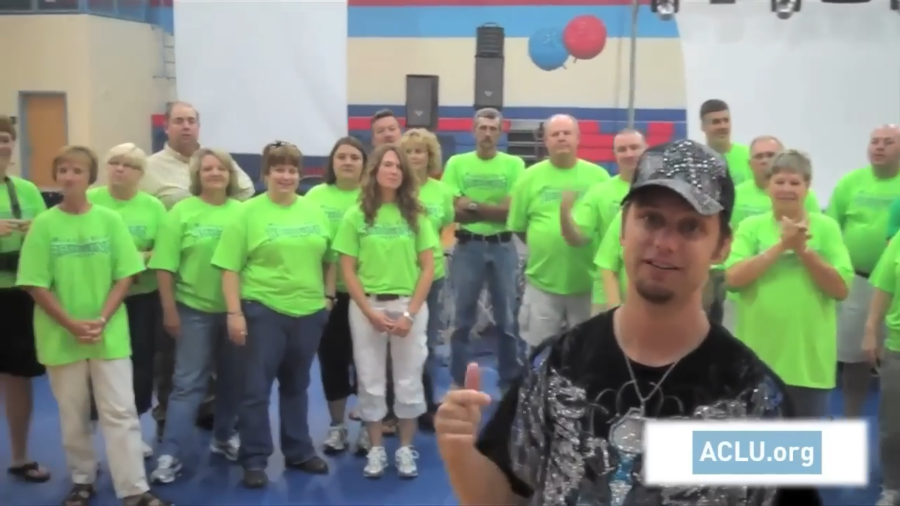Court Blocks Louisiana Law Requiring Public Schools to Display Ten Commandments in Every Classroom
BATON ROUGE, LA – In a victory for religious freedom, a federal district court issued a preliminary injunction today in Rev. Roake v. Brumley, prohibiting implementation of a Louisiana law that requires all public schools to permanently display a government-approved, Protestant version of the Ten Commandments in every classroom.
In the ruling, Judge John W. DeGravelles determined that Louisiana’s H.B. 71, enacted last June, violates the First Amendment and longstanding Supreme Court precedent. More than 40 years ago, in Stone v. Graham, the Supreme Court overturned a similar state statute, holding that the First Amendment bars public schools from posting such displays. The defendants conceded during oral argument that Stone remains good law and is binding on lower courts. In his 177-page opinion, the judge explained:
[T]hese displays must be posted in every “classroom in each school,” all year round, regardless of subject matter, and regardless of the age of the student. Thus, the question is not whether the Biblical laws can ever be put on a poster; the issue is whether, as a matter of law, there is any constitutional way to display the Ten Commandments in accordance with the minimum requirements of the Act. In short, the Court finds that there is not. First, Stone remains good law and is directly on point, and this Court is bound to follow it. Second, even putting Stone aside . . . , Plaintiffs have adequately alleged that H.B. 71 fails to comply with the Establishment Clause analysis laid out in Kennedy and Fifth Circuit precedent.
Judge DeGravelles also recognized that H.B. 71 would lead to unconstitutional religious coercion of the children-plaintiffs in the case by imposing religious doctrine on them for nearly every hour of the school day, throughout their entire public-school education. And, pointing to the testimony of plaintiffs’ expert, Dr. Steven K. Green, the court found that there is no historical support for permanently displaying the Ten Commandments in public-school classrooms and that doing so would be at odds with our nation’s Founders’ understanding of the separation of church and state. The court’s opinion concludes:
Each of the Plaintiffs’ minor children will be forced “in every practical sense,” through Louisiana’s required attendance policy, to be a “captive audience” and to participate in a religious exercise: reading and considering a specific version of the Ten Commandments, one posted in every single classroom, for the entire school year, regardless of the age of the student or subject matter of the course. And, despite the differences among the Plaintiffs’ religious beliefs (be they Unitarian Universalist, Reform Jewish, Presbyterian, or atheist/agnostic), the common threads are (1) that the required posting of the Decalogue conflicts with specific parts of their faith, and (2) that one of those articles of faith, shared by nearly all Plaintiff parents, is raising their children in accordance with their own beliefs and values. Considering the totality of the circumstances, the Court finds that the Act and its requirements are coercive and inconsistent with the history of First Amendment and public education.
The court further ruled that H.B. 71 also violates the plaintiffs’ rights under the Free Exercise Clause.
After finding that the law violates the plaintiffs’ constitutional rights, the court prohibited the defendants from “(1) enforcing H.B. 71; (2) adopting rules or regulations for the enforcement of H.B. 71; and (3) requiring that the Ten Commandments be posted in every public-school classroom in Louisiana in accordance with H.B. 71.”
The Court additionally directed the state defendants to provide notice of its order and H.B. 71’s unconstitutionality to all Louisiana public elementary, secondary, and charter schools, and all public post-secondary education institutions. Because the court denied the defendants’ request to pause (or “stay”) the preliminary injunction while they seek relief from the U.S. Court of Appeals for the Fifth Circuit, it immediately takes effect.
“H.B. 71 is a direct infringement of our religious-freedom rights, and we’re pleased and relieved that the court ruled in our favor,” said Rev. Darcy Roake, who is a plaintiff in the case along with her husband, Adrian Van Young. “As an interfaith family, we expect our children to receive their secular education in public school and their religious education at home and within our faith communities, not from government officials.”
“This ruling should serve as a reality check for Louisiana lawmakers who want to use public schools to convert children to their preferred brand of Christianity,” said Heather L. Weaver, Senior Staff Attorney for the ACLU’s Program on Freedom of Religion and Belief. “Public schools are not Sunday schools, and today’s decision ensures that our clients’ classrooms will remain spaces where all students, regardless of their faith, feel welcomed.”
“We are pleased that the First Amendment rights of students and families are protected by this vital court decision,” said Patrick Elliott, Legal Director of the Freedom From Religion Foundation.
“This ruling will ensure that Louisiana families – not politicians or public school officials – get to decide if, when and how their children engage with religion,” said Rachel Laser, president and CEO of Americans United for Separation of Church and State. “It should send a strong message to Christian Nationalists across the country that they cannot impose their beliefs on our nation’s public school children. Not on our watch.”
“Religious freedom—the right to choose one’s faith without pressure—is essential to American democracy,” said Alanah Odoms, Executive Director of the ACLU of Louisiana. “Today’s ruling ensures that the schools our plaintiff’s children attend will stay focused on learning, without promoting a state-preferred version of Christianity.”
Jon Youngwood, Co-Chair of Simpson Thacher’s Litigation Department, added, “We are heartened by the District Court’s well-reasoned and detailed opinion, which rests upon the wisdom of the First Amendment to the Constitution and the protections it affords regarding the separation of church and state and the free exercise of religion.”
Represented by the ACLU, ACLU of Louisiana, Americans United for Separation of Church and State, and the Freedom From Religion Foundation, with Simpson Thacher & Bartlett LLP serving as pro bono counsel, the plaintiffs in Roake v. Brumley are a multifaith group of nine Louisiana families with children in public schools.
Today’s opinion, issued by the U.S. District Court for the Middle District of Louisiana, is available online here: https://assets.aclu.org/live/uploads/2024/11/LA-10c-Opinion.pdf
Court Case: Rev. Roake v. Brumley
Affiliate: Louisiana




